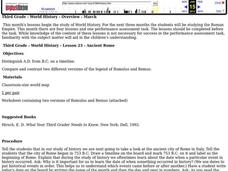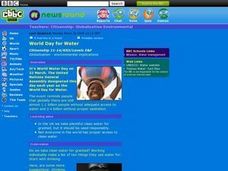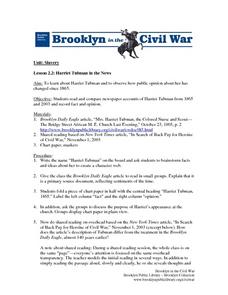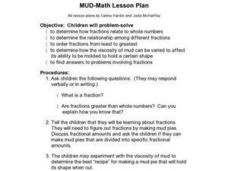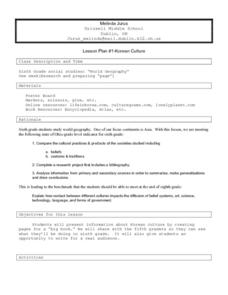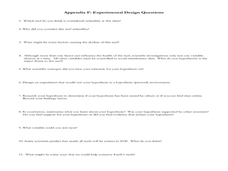Curated OER
How Typical or Atypical is Your Community?
Students analyze and answer specific questions posed by the teacher about their community. They assess how typical a community is by comparing its characteristics to those of the whole nation. They determine how typical or atypical...
Curated OER
Periodic Table Patterns using Fabulous Periodic
Students explain how elements are arranged in the periodic table. In this chemistry lesson, students group the eggs according to a certain pattern. They compare this to elements in the periodic table.
Curated OER
Pioneers Heading West
Young scholars research Pacific Northwest Pioneers in order to create a bio-web poster about the author in which they illustrate and write facts about the pioneer. Students then create a book page about their pioneer to add to a class...
Curated OER
Space Shuttle Statistics
students are the opportunity to enhance their computation skills using real life statistics associated with the Space Shuttle. Skills emphasized include working with fractions, decimals, percents, ratios and proportions, comparing units,...
Curated OER
Periodic Table & Its Trends
Students review atomic structure and then participate in a activity in which they categorize several "elements" into some form of order based on their properties. They discuss the trends they see. They also practice several electron...
Curated OER
Our Classroom-The Community of Fun
Learners identify why trust is important to a community. They explain what is meant by a common resource. They compare and contrast how the community functions when rules are followed or not followed.
Curated OER
Ancient Rome
Third graders distinguish A.D. from B.C. on a timeline. They compare and contrast two different versions of the legend of Romulus and Remus.
Curated OER
Watermelon Math
Learners compute the mean and median of the number of seeds in a watermelon. They work in groups with a slice of water to complete and compare their calculations. They get a class average and mean.
Curated OER
The Mandelbrot Set
Students explore the Mandelbrot Set. They are introduced to the concept of a complex number and function in order to motivate the discussion of Julia and Mandelbrot sets. Students investigate fractals and how they are built.
Curated OER
Clean Water and World Water Day
Students investigate World Water Day in relation to clean water that should be used responsibly. They create lists of ten things they use water for and compare their answers in small groups. They research a documentary for World Water...
Curated OER
Society, Cyberspace and the Future
Students locate information on the rapid growth of world population and consumption needs through the use of Internet, Cd-ROMs, laser dics and other media. They use spreadsheet to present data gathered on world population growth between...
Curated OER
Harriet Tubman In The News
Learners investigate the history of Harriet Tubman. They use newspaper articles from history and modern times in order to gather information. They use a graphic organizer in order to categorize information. They distinguish the readings...
Curated OER
Melodic Variation
Students participate in activities in which they apply various techniques of melodic variation. After reviewing sheet music for the song "Marianne", they compare lines 1 & 3, then 2 & 4 and discuss the variations in the song. ...
Curated OER
Mud Pies
Students determine how fractions relate to whole numbers. They determine the relationship among different fractions and order fractions from least to greatest. They
determine how the viscosity of mud can be varied to affect its...
Curated OER
Get the Skinny on Milk
Students identify the different types of milk available in the market. In this adult health science lesson, students compare their nutrition information. They read milk labels and analyze the nutrients in it.
Curated OER
Leaf Slides
Students, in groups, examine leaf slides in order to explore the detail in leaves.
Curated OER
Heavy Issues
Fourth graders compare the difference between the mass of people, vehicles and trains in order to explain why it is important not to trespass on railroad tracks.
Curated OER
Korean Culture
Sixth graders complete a research project for the sixth grade Big Book that is to be shared with the 5th graders. Students should take their time because the project represents them and the whole class.
Curated OER
Left-Handers Are All Right
Students examine how left-handed people function in a right-handed world using a web resource. They interview left-handed people to further understand the issue. They share the results of the interview with the whole class.
Curated OER
Flip a Coin
Students are introduced to the concept of probability. In groups, they make a prediction about how many times a coin might show heads or tails when flipped. They carry out the experiment and record their results to compare it to their...
Curated OER
Marine Biology Lesson on Understanding the Dynamics of the Reef Ecosystem
Students compare data from a healty and unhealthy reef ecosystem. In this marine biology lesson, students identify which sample is stressed. They formulate a hypothesis on why the reef is stressed and support their hypothesis with proven...
Curated OER
Apples
Students are asked what kinds of vegetables do they like to eat, and what kinds of fruits do they like to eat? They are asked to describe how an apple might taste. Students count the number of green apples, they are told the different...
Curated OER
PBS Kids Go Buster Buster and Beatrice/ The Giant Pumpkins
Second graders visit San Antonio, Texas and Mt. Hood, Oregon in these two episodes of PBS Buster Go Kids. They examine the music and food that is local to San Antonio by looking at images and pretend to play instruments. They use...
Curated OER
Buying in Bulk
Students investigate buying purchases in bulk. In this buying in bulk instructional activity, students consider ways to cut costs and reduce waste in landfills by making bulk purchases.








